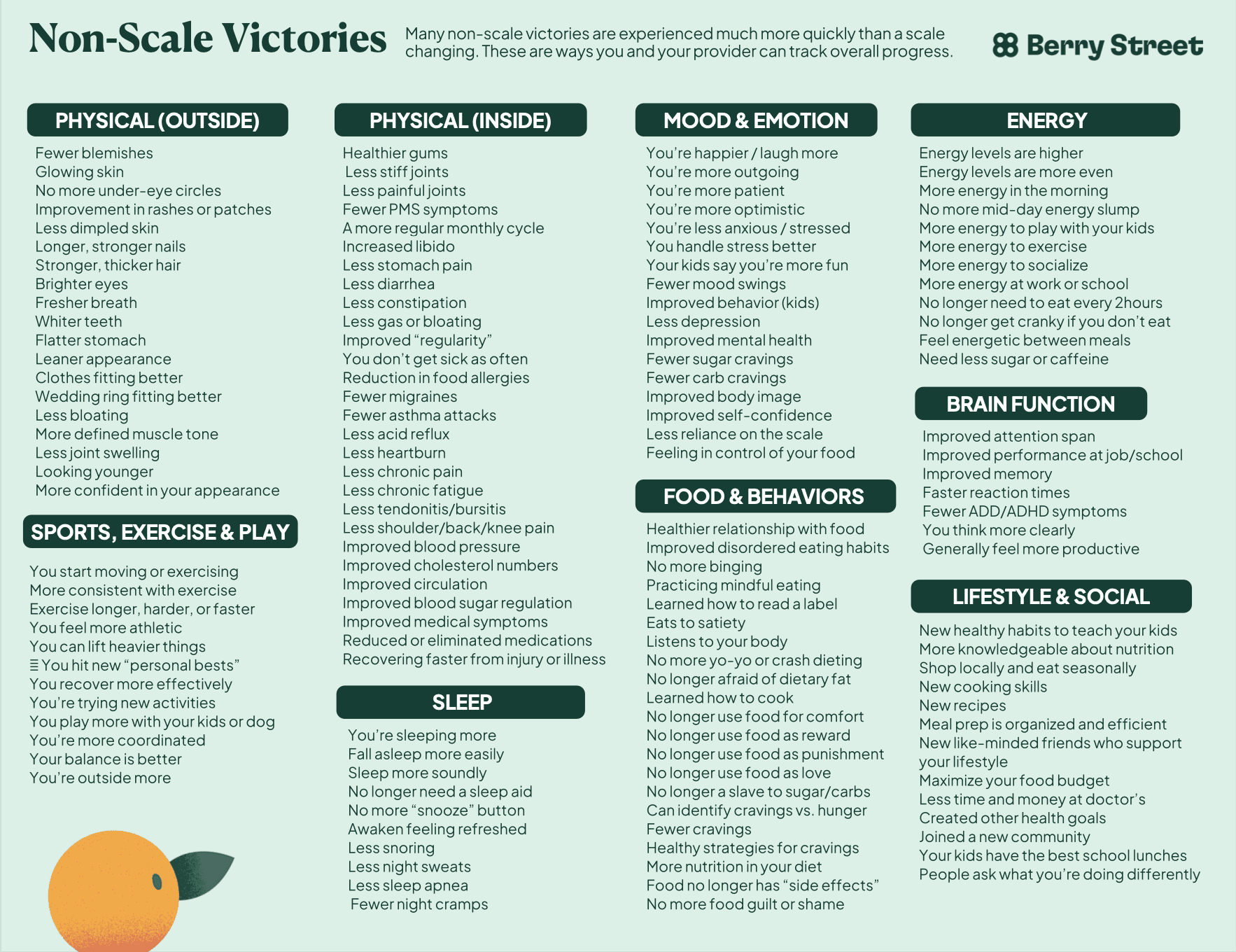If you’re on a health and wellness journey, you may use the scale as a way to measure success. Gaining or losing weight may motivate you on your journey – but it doesn’t share the full picture of your health.
In this article, we’ll explore non-scale victories, how they differ from weight-related goals, and how shifting into a non-scale mindset may help you achieve your goals. Plus, you’ll get access to a free PDF with 90+ real-life examples of non-scale victories.
What are non-scale victories?
Non-scale victories are wins, changes, or achievements that are measured apart from the scale. Instead of prioritizing weight, non-scale victories support a wide range of health related goals from physical achievements to health improvements, and social or mental wins among others.
Non-scale victories act as milestones to help you work toward a goal and subsequently celebrate your success. Having a specific goal in mind is particularly important when you are making behavior changes, so you can feel confident in celebrating your progress.
Physical non-scale victories might include fitting better in your clothing, lifting heavier weights during workouts, reducing joint pain, or running farther.
Lifestyle non-scale victories may focus on hydration or nutrition, or even incorporating stress management techniques. Lifestyle non-scale victories are more focused on behaviors and emotional wellbeing.
Some non-scale victories focus on specific health markers that can be quantified, like your blood pressure or blood sugar levels. This can even result in reducing a medication dosage or stopping the medication altogether.
There are many ways to measure non-scale victories, and these markers can offer new benchmarks far beyond weight loss.
Download our free PDF to see examples of physical, mental, and social non-scale victories. Or, screenshot the quick guide below to have on hand!

How do you shift your mindset from weight loss to non-scale victories?
Making the shift from a weight loss goal to a non-scale victory takes time and active effort. Working with a Berry Street Registered Dietitian can help you understand the language and emotions you hold regarding weight loss, and what shifts you can take to focus outside of the scale.
Your Registered Dietitian will recommend various exercises and activities to help you transition your perspective on goals and achievements, and allow you to feel confident in your non-scale progress moving forward.
Why are non-scale victories important for your health?
Weight loss is not the only way to measure success – and it doesn’t tell us the full picture of your health. On the other hand, non-scale victories use a holistic approach to look at the full picture of your health, from your emotional wellbeing to managing your health conditions and much more.
Non-scale victories also encourage long-term habits. The habits leading to your non-scale victory can be continued throughout your whole life so you retain the benefits you’ve gained. These victories help you create sustainable changes that add up to make a large difference.
How do you track and monitor your non-scale victories?
When setting goals, it’s important to follow the ‘SMART’ method. Setting a ‘smart’ goal means that you will choose a goal that is specific, measurable, achievable, relevant, and time-bound – or simply, ‘SMART’.
On your health journey, you can make a smart goal related to any topic. Examples may include lifting heavier weights or running farther, lowering blood pressure or cholesterol levels, participating in activities you may not have previously (like dancing or hiking), cooking more at home, or incorporating coping skills for stress. These goals all support your health far beyond the scale, and can be monitored for success.
If you can currently run 1 mile, create a ‘smart’ goal that can become a non-scale victory. Maybe you’d like to run a 5k (specific, measurable, relevant, and achievable with proper training) 6 months from now (time-bound). Or, if you tend to choose takeout over cooking at home, you might make a ‘smart’ goal of cooking 4 dinners at home every week for the next 3 months. This goal is now specific, measurable, relevant, achievable with planning, and time-bound.
Whatever your goal is, aim to make it ‘smart’ so you can monitor your progress and celebrate your non-scale victory success.
Conclusion
While weight loss is a common nutrition goal, it isn’t the only goal that can help you find success in your wellbeing. Non-scale victories offer alternatives to weight loss that can help you achieve greater health emotionally and physically.
If you struggle to make the mindset shift from weight loss to non-scale victories, work with a Berry Street Registered Dietitian for education and accountability so you can approach your health holistically.













